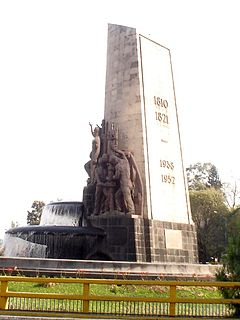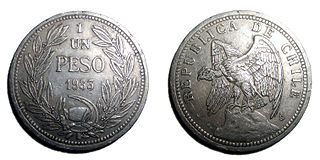 W
WThe Estonian Land Reform Act 1919 was passed in Estonia on the 10 October 1919 shortly after the independence of the nation earlier that year. The act expropriated land from the Baltic German landowners which had previously made up much of the landowning elite. As part of the act the government distributed the nationalised land to mainly Estonian small farmers.
 W
WThe Mexican oil expropriation was the nationalization of all petroleum reserves, facilities, and foreign oil companies in Mexico on March 18, 1938. In accordance with Article 27 of the Constitution of 1917, President Lázaro Cárdenas declared that all mineral and oil reserves found within Mexico belong to "the nation", i.e., the federal government. The Mexican government established a state-owned petroleum company, Petróleos Mexicanos, or PEMEX. For a short period, this measure caused an international boycott of Mexican products in the following years, especially by the United States, the United Kingdom, and the Netherlands, but with the outbreak of World War II and the alliance between Mexico and the Allies, the disputes with private companies over compensation were resolved. The anniversary, March 18, is now a Mexican civic holiday.
 W
WThe nationalization of the Chilean copper industry, commonly described as the Chileanization of copper was the process by which the Chilean government acquired control of the major foreign-owned section of the Chilean copper mining industry. It involved the three huge mines known as 'La Gran Mineria' and three smaller operations. The Chilean-owned smaller copper mines were not affected. The process started under the government of President Carlos Ibáñez del Campo, and culminated during the government of President Salvador Allende, who completed the nationalization. This "act of sovereignty" was the espoused basis for a later international economic boycott, which further isolated Chile from the world economy, worsening the state of political polarization that led to the 1973 Chilean coup d'état.
 W
WThe nationalization of PrivatBank by the government of Ukraine, taking 100% ownership, occurred on 18 December 2016.
 W
WThe nationalization of the Iranian oil industry resulted from a movement in the Iranian parliament (Majlis) to seize control of Iran's oil industry, which had been run by private companies, largely controlled by foreign interests. The legislation was passed on March 15, 1951, and was verified by the Majlis on March 17, 1951. The legislation led to the nationalization of the Anglo-Persian Oil Company (AIOC). The movement was led by Mohammad Mosaddegh, a member of the Majlis for the National Front and future prime minister of Iran. The movement to nationalize the oil industry was the reaction to the following concessions made by Iran to foreign powers: the Reuter concession of 1872, proceeding letter,D'Arcy Concession?] the 1933 agreement between the Iranian government and AIOC, and the Gas-golshaian[?] contract. According to the political scientist Mark J. Gasiorowski, the oil nationalization movement had two major results: the establishment of a democratic government and the pursuit of Iranian national sovereignty.
 W
WPakistan Television Corporation is the Pakistani state-owned broadcaster. Pakistan entered the television broadcasting age in 1964, with a pilot television station established at Lahore. This is the venue from which Pakistan's first television broadcast was aired in black & white on the historic date: 26th November, 1964.
 W
WThe Peruvian nitrate monopoly was a state-owned enterprise over the mining and sale of saltpeter created by the government of Peru in 1875 and operated by the Peruvian Nitrate Company. Peru intended for the monopoly to capitalize on the world market's high demand for nitrates, thereby increasing the country's fiscal revenues and supplementing the financial role that guano sales had provided for the nation during the Guano Era (1840s-1860s).
 W
WIn 1948, during President Juan Perón's first term of office, the seven British- and three French-owned railway companies then operating in Argentina, were purchased by the state. These companies, together with those that were already state-owned, where grouped, according to their track gauge and locality, into a total of six state-owned companies which later became divisions of the state-owned holding company Ferrocarriles Argentinos.
 W
WPresident Cristina Fernández de Kirchner of Argentina introduced a bill on April 16, 2012 for the partial renationalization of YPF, the nation's largest energy firm. The state would purchase a 51% share, with the national government controlling 51% of this package and ten provincial governments receiving the remaining 49%. The bill was overwhelmingly approved by both houses of Congress, and was signed by the president on May 5.
 W
WThe nationalization of the means of production was a measure taken by Romania's new Communist authorities in order to lay the foundation of socialism. The act that allowed this measure to take place was Law 119, adopted by the Great National Assembly on June 11, 1948. Article 1 decreed subject to nationalization "all the wealth of the soil not in the property of the state at the time of entry into force of the Constitution of the Romanian People's Republic, as well as individual enterprises, societies of any type and private industrial, bank, insurance, mining, transport and telecommunications associations". Nationalized were 8,894 industrial, mining, transport, banking and insurance companies, followed in November 1948 by 383 cinemas and medical-sanitary facilities. By 1950, the measure was applied to chemical enterprises, pharmacies and remaining economic entities.